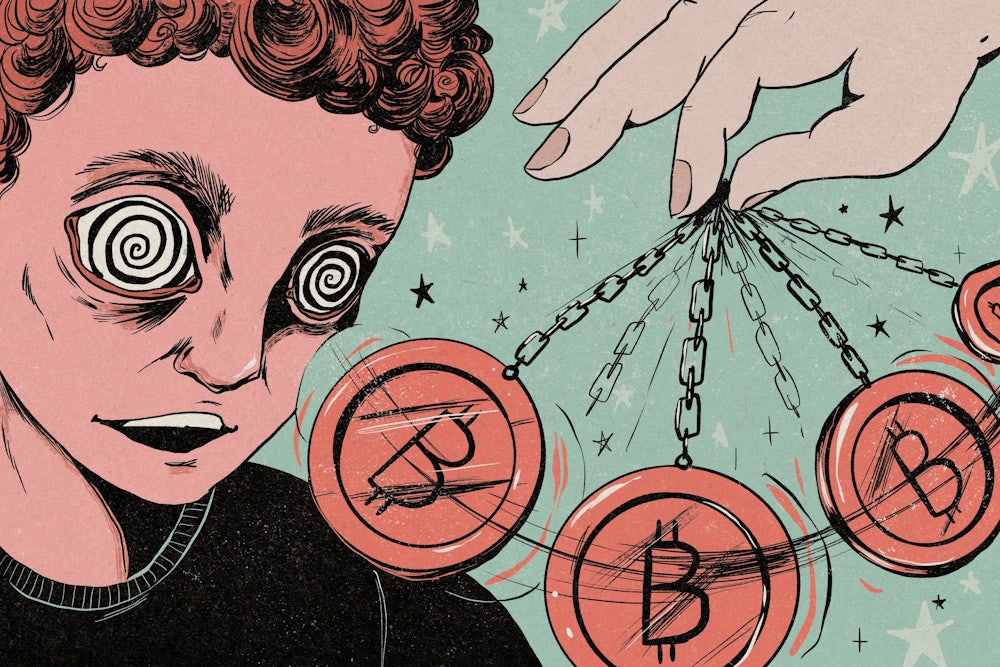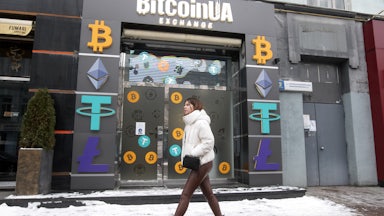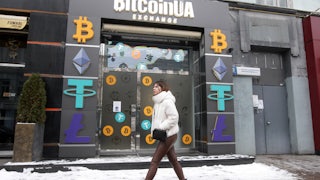In June 2020, a few months after Covid-19 landed on America’s shores, a tech entrepreneur published an article in Forbes warning that pandemic conditions were leading to a dramatic rise in fraud and cybercrime. With much commerce, social life, and work moving online, she warned, scammers had more opportunities to extort innocent people. And with the advent of online payment networks and cryptocurrencies, it was easier than ever for criminals to steal and launder money from victims all over the world.
Almost two years later, the Department of Justice arrested the author of that article for her alleged participation in one of the largest money-laundering schemes of all time. According to court documents, Heather Morgan and her husband, Ilya Lichtenstein, were in possession of almost 100,000 bitcoin pilfered from Bitfinex, a popular cryptocurrency exchange, in 2016. At the time of the theft, the cache of bitcoins was worth about $70 million. When Morgan and Lichtenstein were arrested six years later, bitcoin’s value had soared, making the stolen tokens worth a remarkable $3.6 billion.
Within hours of their arrest, Morgan and Lichtenstein were catapulted into the realm of viral celebrity and semi-ironic folk heroes. The couple may have committed a crime, but they did so in such an apparently sloppy and extravagant fashion that online gawkers could not help but appreciate their antics. Subsequent reporting also revealed that Morgan and Lichtenstein had received a Paycheck Protection Program loan for $11,000 from the U.S. government. Even fraudsters holding billions in crypto won’t blush at the chance to abscond with a little more fiat.
With apologies to all-star scammers like Bernie Madoff and Fyre Festival’s Billy McFarland, Morgan and Lichtenstein may turn out to be the emblematic fraudsters of our age. From their ridiculous (and highly public) social media posts to their inscrutable decision to remain in Manhattan, rather than fleeing to a foreign jurisdiction, they project a bizarre lack of competence, which makes them fitting figureheads for an era defined by rampant corporate malfeasance, wage theft, and a surge in fraud and financial crimes. Borrowing from the investor Jim Chanos, whose successful short bets include Enron and Wirecard AG, we call it the golden age of fraud, and it potentially affects us all.
A combination of Trump-era corporate impunity, liquidity provided by the Federal Reserve’s quantitative easing, abundant venture capital sloshing around the system, occasional stimulus checks, bored quarantined Americans, income inequality, and casino capitalism brought us to a place where financial scams and frauds are ubiquitous and valorized by some of the culture’s most familiar faces—a time when the main way to get ahead seems to be making reckless bets on potentially worthless digital assets. Next to sports gambling, which, thanks to a recent wave of state-led legalization is now available to about 100 million Americans, the fullest expression of this new age of fraud can be found in the increasingly celebrified world of crypto speculation, where technology and pop culture combine to make fraud a prominent, even essential feature of the landscape. It’s not uncommon for crypto enthusiasts to compare their projects to Ponzi schemes—and to do so proudly. A classic American scam is now being rehabilitated as a potential business model for the crypto economy, especially in the realm of DeFi (short for “decentralized finance”).
Crypto numbers can be unreliable—according to some studies, up to 90 percent of trading on most exchanges is “wash trading”: fake trades designed to generate a false impression of volume, which in turn attracts more traders and influences prices. But the numbers we do have, while approximate, speak to a booming industry defined largely by volatile speculation and fraud. In 2021, consumers spent an estimated $25 billion on non-fungible tokens, or NFTs (a crypto subindustry in which wash trading is also endemic). During the same period, DeFi scams robbed people of more than $10 billion. The crypto industry has seemingly endless cash (some endorsement deals involve crypto or company equity) to splash around on stadium naming rights, commercials with Matt Damon and LeBron James, and tech-industry talent. Mirroring aspects of multilevel marketing, in which participants are compelled to bring in new suckers through the door, crypto is both the preeminent get-rich-quick scheme of our time and mistrusted by many. That dissonance—where potential financial opportunity, however deceptively sold, meets extreme risk—is a hallmark of the golden age of fraud.
A quick look at consumer data and government reports shows that now is a good time to be a scammer. From catfishing—a quarter of all fraud reported to the Federal Trade Commission last year originated on social media—to identity fraud, ransomware, and old-fashioned phone scammers trying to wheedle bank information out of elderly people, there seem to be ever-proliferating varieties of grift and ways for criminals to extract payment. With the pandemic driving people to spend more time (and money) online, crypto wallets and PayPal login credentials have become juicy targets alongside credit cards and social security numbers. “The pandemic has created so many more points of vulnerability,” an insurance company CEO told CNBC last year. While her Forbes article was no great shakes, Heather Morgan clearly understood that circumstances had changed—and might favor criminals like her.
The golden age of fraud has been percolating through the culture for years now. One of the more popular current shows on Netflix is about Anna Delvey, a con artist who defrauded a range of wealthy Manhattanites, along with banks and hotels, and who attracted her own legion of fans after her arrest. In California, Elizabeth Holmes awaits her legal fate for leading the multibillion-dollar Theranos scam. From WeWork’s reckless spending to the Sackler family’s deadly pushing of opioids, corporate America has decided that the normal rules, and perhaps the law, don’t apply to it. The Republican Party, devoid of ideas beyond angry culture warring, remains in thrall to former President Donald Trump, the country’s most stubbornly successful conman, whose new media company may, for the moment at least, be worth billions despite having almost no assets or income. (Trump’s balky new social network, Truth Social, is merely a rejiggered version of Mastodon, an open-source social media platform.)
In the golden age of fraud, grift sits comfortably alongside the general sense of unreality permeating the American economy. JPEGs sell for millions of dollars and are denominated as a new asset class, despite the many practical and philosophical problems accompanying them. Ephemeral meme stocks and dog-themed crypto tokens outperform deep-pocketed companies that actually, you know, make things. The world’s richest man, Elon Musk, owes his fortune to a state-subsidized electric car company that produces far fewer vehicles than his competitors but is worth more than almost all of them put together. (Although it must be said that Musk’s rivals often aren’t much better: Volkswagen, the number-two car company in the world by revenue, cooked the books for years by rigging emission-detection software.)
Most frauds are indefensible, but their motivations don’t have to be inexplicable. Some people are attracted to the deception itself. In a time of vast inequality, defrauding a wealthy institution—whether absconding with free cable or filing a not-entirely necessary application for a PPP loan—can seem practically like a victimless crime, if not an act of rebellion. The author Dan Davies, in his brilliant book Lying for Money, describes what the criminologist Daniel Cressey called the “fraud triangle,” which has three sides: need, opportunity, and rationalization. The pandemic era has turbocharged each side of that triangle.
At first glance, one might assume any level of fraud is a drag on economic activity as fraud is a negative-sum game, diverting resources from potentially productive uses and harming social cohesion. But as Davies notes, a certain low level of fraud may not be a necessary evil for the adequate functioning of a “high-trust society,” such as the United States or Canada, but rather a healthy component of it. The more people trust one another, the more risks one can take with that trust. (Of course the risks you take with other people’s money are often greater than with your own.) Over time, more risk-taking is necessary to spur further economic activity and innovation. Taking those risks requires raising capital. But for every great advance that involved extreme risk-taking, there are scores of abysmal failures where investors lost all their money, and some of those turn out to be frauds. Fraud is perfectly situated to take advantage of this tension between risk-taking for positive societal benefit and a deadweight loss to an economy, as it often relies on selling investors on the hope of some new, usually complicated, way of creating value. Or to put it differently, there is a thin line between “innovation” and scamming someone out of their money.
Uber is a great example. The ride-hailing company gobbled up market share in the U.S. and around the world by moving into new jurisdictions and flouting local labor laws and taxi regulations. Its innovation was to perform regulatory and legal arbitrage, ignoring laws it didn’t like and lobbying to pass news ones that would serve its business. While Uber grew enormously, the gambit hasn’t entirely worked: Uber still loses billions of dollars annually, though in some of its quarterly earnings reports it has used accounting trickery to claim small profits. But even if Uber’s own finances are troubled, the company has made executives and investors enormously wealthy. Its value, then, depends on your perspective.
The cryptocurrency industry may be the ultimate distillation of the golden age of fraud. Like Uber, it’s benefited from vast sums of cheap investment capital and pliant public officials easily charmed by new technologies. But whereas Uber provides a clear service, albeit at the expense of underpaid gig workers, the use cases for crypto remain uncertain, even as it drapes itself in utopian rhetoric about financial revolution. Wild volatility, a lack of payments infrastructure, rampant scams, and technical complexity make crypto an unappealing choice to be a real currency or store of value. And its environmental impact and Ponzi-like economics—new investors are required to buy out the old—mean that it may actually be a negative-sum game.
In a hype economy built on froth, virality, misinformation, and celebrity endorsements, crypto has no apparent utility besides being a source of risky speculation. As economists from both the left (Krugman, Roubini) and right (Hanke) have pointed out, crypto has no inherent value except what another person might pay for it. In economics, this is referred to as the “greater fool” theory. At its base, crypto is private money (an outdated notion from the nineteenth century) that largely runs on rails purposefully set up to be outside the banking system and away from those pesky government authorities with their annoying focus on transparency and the rule of law. Its value is a collective hallucination, dependent on constant salesmanship and, in some cases, deception and market manipulation.
Confronting the golden age of fraud means tackling corporate criminal impunity, income inequality, and some of the other basic inequities of our economy—and not by financializing everything on overseas crypto markets. (After all, to paraphrase Motherboard’s Edward Ongweso Jr., you can’t democratize Goldman Sachs.) It means enforcing laws on the books—much of the legal framework for regulating cryptocurrencies like securities already exists—and developing new regulatory measures, like President Biden’s just-signed executive order on crypto, to stymie the novel forms of manipulation and theft that have cropped up in recent years. It means being as tough on Wall Street as on the wildcat crypto bankers operating out of the Bahamas, who are buying up stadium sponsorships and the loyalty of an increasing number of predominantly (but sadly not exclusively!) Republican politicians, who have developed a crude “God, Guns, and Bitcoin” mantra that conveniently positions them against the federal government they work for while also attracting crypto industry donations. (The number of crypto lobbyists in D.C. has tripled since 2018, according to a recent report from Public Citizen.) It also means educating the public that what can seem like a novel path to easy wealth often comes with some pretty terrible, and unexpected, externalities.
The golden age of fraud is defined by the brazenness of its criminal set, who lack shame and often seem to relish their own sketchy behavior. Call it the Martin Shkreli paradigm, after the pharmaceutical price gouger who showed no remorse until, finally facing jail time, he broke down in front of a judge. So while some of today’s fraudsters eventually find their comeuppance, most have come to expect impunity, which is perhaps why Heather Morgan and Ilya Lichtenstein made the unwise decision to stay in the U.S. Much of the cryptocurrency industry prefers to operate extraterritorially or in island nations known for their friendliness toward shell corporations and shadow banking. (Bitfinex is registered in the British Virgin Islands.) But Morgan and Lichtenstein thought that they could get away with their heist here at home—and didn’t mind chronicling their shambolic hustle and garish taste in a litany of TikTok videos.
If one has the feeling that we’re all being robbed—that both crypto scammers and megamillionaires like Tom Brady are pulling down PPP loans they shouldn’t have a right to; or that members of Congress are making millions by apparently trading on inside information—it’s because we are. Fraud is an anti-social crime, undermining trust and robbing others of opportunity. What makes it more infuriating is that today’s criminals seem to act not only without remorse but flamboyantly, with social media as their stage. There are no Robin Hoods in this individualist culture, only aspiring influencers looking for the next payday, however illicit.






